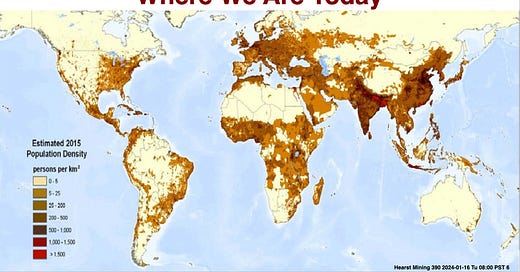Econ 115 :: The World Economy in the 20th Century :: Lecture 1 :: Introduction
The slides and some highlights from the first lecture of my first post-big book excursion through the economic history of the 20th century...
The slides and some highlights from the first lecture of my first post-big book excursion through the economic history of the 20th century...
& a start-of-semester sale for academic .edu email addresses:
Lecture Highlights:
As you read Paul David’s “Clio and the Economics of QWERTY”, think that this is Paul David’s short attempt to convince the economists at the American Economic Association Annual Meeting that they are doing it wrong. Economists say: (1) You specify a system. (2) Having specified a system, you then calculate its equilibrium configuration. (3) You then assert that the system is either in or will soon be in equilibrium. (4) You then assert that if the system is in equilibrium, it will stay there—or, at least, shocks and their dynamic effects can be analyzed via standard perturbation-theory mechanisms. (5) You then you stop. Paul David says: Really, it is not that simple. If there is a current equilibrium, it is what it is because it is loaded down with huge amounts of historical baggage. You are very unlikely to understand what is what and why without looking back and closely observing the historical process of how what is came to be over time.
From the long-run perspective, the speed at which technological knowledge has spread out over the post-1870 world is remarkable. Suppose you had told John Stuart Mill in 1870—suppose you had told Intel founder Gordon Moore in 1965, when he was setting out Moore’s Law—that, come 2024, the Intel Corporation would be fighting for its life and its future because it was being greatly, greatly outmatched by TSMC, a company on the island of Taiwan which had managed to produce chips with six times the transistor density of the best that Intel could accomplish, and had managed to produce them much cheaper than Intel could. That the grandchildren of the farmers of Taiwan in 1965, the great-great-great-grandchildren of the farmers of Taiwan in 1870, of those for whom it was a good week if they got three eggs—that they would be the most productive workers in the world embedded in the most capable and efficient productive value chain the world has ever seen. Neither John Stuart Mill nor Gordon Moore would have had that on any of their Bingo cards.
Before 1500 we arelucky if we get 6% of technology growth per century, Now we get 2% per year. We get more proportional technological change in our world today proportionately to our level than people back before 1500 would have gotten in a century. And, if trends hold, over the course of history from your births just after 2000 until your deaths not that long before 2100, you will see more proportional technological change than the world got from the year -1500 to 1500.
And it's not just we get MOAR technology, we get different kinds of technology. Commercial-society gunpowder-empire technology is qualitatively very different from steampower mode-of-production technology. Steampower is profoundly different from applied-science, which is different from mass-production, which is different from global value-chain technology. And the attention-algorithmic info-biotech mode-of-production technologies you will see will be qualitatively very different from the global value-chain technology world I have lived through.
bCOURSES HOME PAGE: <https://bcourses.berkeley.edu/courses/1531168/>
Course Procedures: <https://bcourses.berkeley.edu/files/87866083/>
Course Schedule & Readings: <https://bcourses.berkeley.edu/files/87866231/
Econ 115 at Schedule of Classes. <https://classes.berkeley.edu/content/2024-spring-econ-115-001-lec-001>
Econ 115 Piazza signup link: <https://piazza.com/berkeley/spring2024/econ115>
2024-01-16 Tu: The Long 20th Century: A Grand Narrative
Readings:
DeLong, J. Bradford. 2022. Slouching Towards Utopia: An Economic History of the Twentieth Century. New York: Basic Books <bit.ly/3pP3Krk> <https://bcourses.berkeley.edu/files/87705514/download?download_frd=1>, “Introduction”
Block, Fred. 2001. "Introduction." In The Great Transformation: The Political and Economic Origins of Our Time, by Karl Polanyi, xxix. Boston: Beacon Press. <http://www.compilerpress.ca/Competitiveness/Anno/Anno%20Block%20Intro%20Great%20Transformation%202000.htm>
David, Paul. 1985. “Clio and the Economics of QWERTY,” American Economic Review Papers & Proceedings 75, pp. 332-337. <http://www.jstor.org/stable/1805621>





